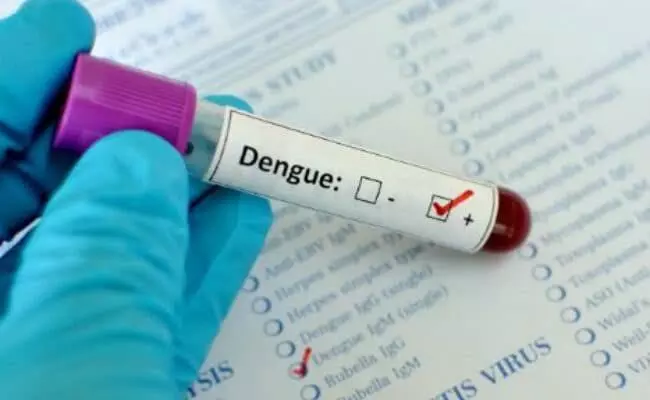Exercise caution in festive time; dengue, viral fevers still a threat
General physicians across various big and small hospitals are coming across dengue cases almost every day, across all age groups
By Sulogna Mehta
Representational Image
Hyderabad: Even with rains playing havoc in the city for the most part of this year’s monsoon, dengue cases have not been as many as one would expect. Also, fortunately, no dengue deaths have been reported this year so far. However, doctors ask citizens to exercise caution as dengue and other fevers are expected to continue into the next month.
General physicians across various big and small hospitals are coming across dengue cases almost every day, across all age groups. More cases have been reported in hospitals on the outskirts. Various types of flu and respiratory viruses are behind more fever cases than dengue this year.
Out of every 10 fever cases, two to three are those of dengue, while seven to eight are caused by other types of viral fevers and respiratory illnesses, according to health experts. A few chikungunya cases have also been reported. In comparison, malaria cases in urban areas have been extremely rare.
Low platelet count among patients
According to Dr Yasmin Pathan, general medicine and infectious diseases expert at Arundathi Hospital in Dundigal, out of every 200 patients at the OPD, around 40 patients, that is 20 per cent, test positive for dengue. Malaria cases are fewer, at around 5 per cent. All age groups are getting affected, she said.
“Most of the patients are migrant workers from northern states and seem to live in unhygienic conditions. In some cases, platelet counts are coming down rapidly but luckily there are no deaths. We are seeing dengue and fever cases since June. In August, incidences were quite high. We expect cases to continue till around mid-October and if it rains more, cases will proportionately increase. Apart from dengue, we are seeing quite a lot of influenza, flu and other viral fevers such as swine flu and RSV or respiratory syncytial virus cases,” said Dr Yasmin.
Three phases of dengue
Dengue fever manifests in three phases.
The first phase is the febrile phase marked by high-grade fever, body pain, headache, dehydration etc., which lasts for around five days. The haematocrit level (ratio of the volume of red blood cells to the total blood volume) comes down and viraemia or the viral load increases.
The second phase lasts from days 5 to 7 and is called the critical phase where the haematocrit level goes up a bit and the platelet count comes down. Due to dehydration, patients suffer from low BP, shock, bleeding, organ failure etc.
The third phase is the self-limiting recovery phase, where the haematocrit level again goes down and the platelet count normalises in about a week.
Patients left extremely weak after recovery
Though dengue cases are being reported daily, the overall prevalence is neither too high nor too severe. Platelet transfusion and hospitalisation are required in less than 5 per cent of cases. But dengue is leaving patients extremely weak, who often complain of joint pain, body pain etc. after recovery, said Dr Tudi Pavan Reddy, senior consultant general physician from KIMS Sunshine Hospital.
“However, elderly people, pregnant women, comorbid patients like diabetics, those taking hypertension medicines, those having a history of dengue and low on immunity should consult doctors regarding their medication and treatment,” the doctor said.
Wear masks and drain stagnated water
Since the festive season has started, doctors suggest the public wear masks in crowded areas. “When one has a viral fever or suspected dengue, take only paracetamol tablets and not antibiotics since these are not bacterial infections. Also, drink lots of fluids including water, buttermilk, fruit juices etc. to prevent dehydration, which can complicate the dengue condition. Remember not to use painkillers as well. If the fever does not come down despite taking paracetamols for three to four days, then visit the nearest fever clinic and get tests done as suggested by doctors. Prevent any water stagnation indoors as well as in surrounding areas of the house. In case, one person from a gated community or from a hostel has been affected by dengue, notify the municipal or civic authorities so that precautions are taken and further spread of the disease is prevented in those localities,” advised Dr Pavan.
Health officials discuss measures to control cases
Meanwhile, top officials from the health department conducted a review meeting on the situation of seasonal diseases recently, which was attended by principal secretary (health) Syed Ali Murtaza Rizvi, director of Public Health Dr G Srinivasa Rao, director of Medical Education (DME) Dr Ramesh Reddy, TVVP commissioner Ajay Kumar, district medical and health officers (DMHOs) of all districts, heads of teaching hospitals, superintendents of district hospitals etc.
The officials told the public to be aware of seasonal diseases even though there is no cause for alarm from fever cases in the state. They observed that there is no truth in the propaganda that dengue cases are increasing or dengue deaths are occurring.
So far not a single death has been recorded. However, dispensaries should be prepared to cope with any situation due to the continuous rains. Details of fever victims should be entered in the portal from time to time. Based on that data, DMHOs should identify high-risk areas and take precautionary measures. Village and basti dispensaries should be alerted where fever is recorded.
Lab reports should be provided within 24 hours. However, if the patient has suspicious symptoms, treatment should be started immediately without waiting for reports. Separate Out-Patient (OP) counters should be set up for fevers if required. Children should be monitored for fever. A 24-hour call centre should be set up in the districts and the public should be informed.